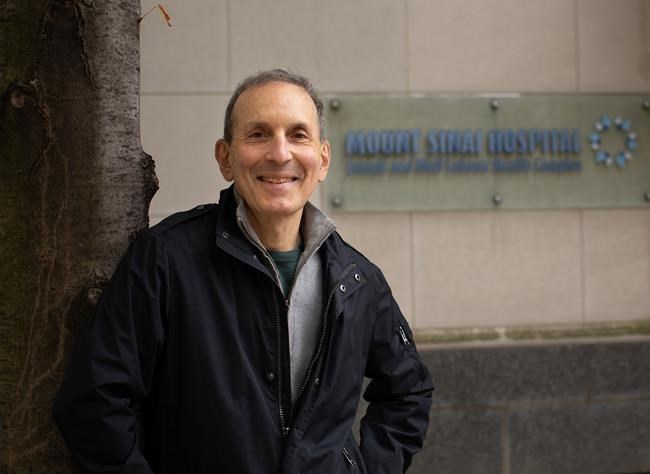
Dr. Daniel Drucker, shown in a handout photo, a professor of medicine at the University of and senior scientist at Sinai Health, is being honoured with an international award for his role in research that's helping revolutionize treatments for type 2 diabetes, obesity and intestinal disorders. THE CANADIAN PRESS/HO-University of Toronto-Johnny Guatto MANDATORY CREDIT
Republished April 07, 2021 - 12:30 PM
Original Publication Date April 07, 2021 - 9:10 AM
TORONTO - Dr. Daniel Drucker didn't expect his decades-worth of groundbreaking research on gut hormones to garner so much attention in the early stages of the COVID-19 pandemic.
The endocrinologist and senior scientist at Sinai Health — who was named a winner of the 2021 Canada Gairdner International Award on Wednesday — had been focused on the diabetes and obesity treatments that earned him renown when the pandemic initially closed his lab last March.
Butsoon after, the flood of calls and emails started pouring in from scientists wanting to know whether one of the enzymes he had been studying for years — dipeptidyl-peptidase-4 (DPP4) — was acting as a SARS-CoV-2 receptor, allowing the virus to enter cells the way it did for other coronaviruses such as MERS.
And if so, could the diabetes treatment he'd helped develop treat COVID patients?
Drucker, also a professor at the University of Toronto's medical school, found that DPP4 wasn't acting as a COVID receptor as some believed, but the links between COVID and diabetes were becoming too apparent to ignore.
"People with obesity and diabetes were among those getting the most ill from COVID-19, their requirement for intensive care was greater, their mortality rate was greater," Drucker said Wednesday.
"So there was this constant dynamic of questions surrounding my research area, but directly relevant to COVID-19, that gradually nudged me into becoming more involved in COVID-19 diabetes work."
Drucker's earlier research, which helped revolutionize treatment for type 2 diabetes, obesity and intestinal disorders, earned him the Gairdner Award along with colleagues Joel Habener of Harvard and Jens Holst of the University of Copenhagen.
The trio was recognized for their independent and collaborative research over the last four decades on glucagon-like peptides — hormones in the gut that help control blood sugar. Their work eventually led to the creation of several new classes of drugs that have been used to treat more than 100 million people worldwide.
Drucker said he was "ecstatic, grateful and honoured" to receive the award from the Gairdner Foundation, which recognizes key medical research around the world each year.
The foundation has given out 395 awards to scientists from 35 countries, and about one quarter of those winners later went on toreceive Nobel Prizes.
Drucker described his award-winning work as "decades of basic science that led to new therapies."
"But it's always a pleasure and a privilege to be recognized for the work my students have done and that I've done," he added.
Lately, Drucker has become more engrossed in studying links between COVID, diabetes and obesity, writing papers and giving lectures throughout the pandemic.
While diabetes doesn't increase the chance someone will get a COVID infection, Drucker said it does make them more susceptible to a severe outcome. Data from New York City hospitals from March 1 to April 4, 2020 showed 33.8 per cent of COVID patients had diabetes while 41.7 were obese.
Early reports from China, meanwhile, showed the odds of in-hospital death from COVID-19 to be "2.85 times higher" in diabetics than in those without the condition, according to Diabetes Canada.
Recently, scientists have posited that COVID could also lead to new onset diabetes, noting an uptick in diabetic diagnoses in those who have recovered from the virus.
Drucker said it's hard to know for sure if COVID-19 infections are responsible though, adding that's something endocrinologists and researchers willlook at closely over the coming years.
We have, however, learned a lot over the last 15 months about diabetes and obesity, Ducker said, including that type 1 diabetics are less at risk of severe COVID disease than those with type 2.
That could be because type 1 diabetes, previously referred to as juvenile-onset diabetes, tends to affect younger people, Drucker said. Type 2, meanwhile, generally afflicts older people who are more likely to suffer other conditions such as obesity, hypertension, high cholesterol and blood vessel damage that could worsen infections further.
But, Drucker added, those with poorly controlled diabetes — regardless of the type — are at a higher risk of serious COVID than those whocontroltheir blood sugar.
Drucker said he's pleased to see that most countries have acknowledged the link between COVID and diabetes, moving diabetics and obese people up the vaccination queue.
But until vaccinations can effectively end the COVID threat, he said diabetics need to take extra care.
"The message should be: Do as much as you can to optimize your health," Drucker said. "Control your diet, get plenty of exercise, and try and control your blood sugar as best you can."
This report by The Canadian Press was first published April 7, 2021.
News from © The Canadian Press, 2021